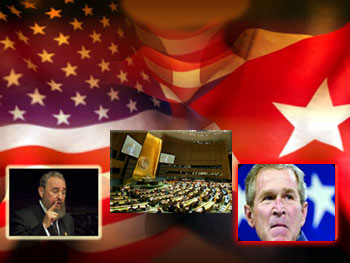UN General Assembly votes 184-4 in favor of lifting U.S. embargo on Cuba
- Cuba: President Bush has no moral authority (FCN, 10-22-2007)
- Why does the U.S. government hate Cuba? (FCN, 04-10-2006)

UNITED NATIONS (FinalCall.com) – For the 16th consecutive year, the United Nations General Assembly (GA) met on Oct. 30 to debate a draft resolution on the necessity of ending the economic, commercial and financial embargo imposed by the United States against Cuba.
And once again, the majority of the 192-member GA voted in favor of lifting the crippling sanctions. The Assembly reiterated it’s “call upon states to refrain from promulgating and applying laws and measures” that violate the spirit of the UN Charter.
Just as in 2006, four nations voted against the resolution: The United States, Israel, Marshall Islands and Palau–while Micronesia abstained. The vote this year was 184 in favor, a far step since 1992 when 59 nations voted in favor of the resolution. In 1995, the count was 182 in 2005, while in 2004, it was 179.
Cuban Foreign Minister Felipe Perez Roque hailed the vote as a “splendid victory.” The vote actually comes a week after U.S. President George W. Bush said he would keep in place the sanctions.
“As long as the regime maintains its monopoly over the political and economic life of the Cuban people, the United States will keep the embargo in place,” Pres. Bush insisted.
Addressing the GA before the vote, Mr. Roque said the blockade “has never been applied with as much ferocity as in the past year, noting that Washington barred U.S. companies from providing Internet services to Cuba and prevented Cuban children from gaining access to needed medications.”
The vote in the GA, according to Mr. Roque, was “the universal rejection of the policy of blockade and aggression which Mr. Bush like no other U.S. president has applied toward Cuba.”
Speaking on behalf of the U.S. administration was Ronald Godard, a senior advisor for the State Department specializing in Latin American affairs. He told the world body that Cuba was responsible for its economic woes.
“Cuba’s problems derive not from any decision of the United States, but from the embargo on freedom that the Cuban regime has imposed on its own people,” Mr. Godard stressed, adding, “We call on the international community to join together in demanding that the Cuban government unconditionally release all political prisoners as the essential step in beginning a process that restores to the Cuban people their basic human rights.”
UN Secretary-General Ban Ki-Moon presented the GA with a report on the implementation of last year’s resolution, 61/11, (document A/62/92), which includes information offered by 118 governments, as well as 20 organizations and agencies of the UN system.
Because Cuba was the subject of the Secretary General’s report to the GA, they were allowed to make their own separate submission of evidence that included a quote from a declassified U.S. government document from 1960. This historical document–by former Deputy Assistant Secretary of State for Inter-American Affairs, Lester Dewitt Mallory–stated that the purpose of the embargo was to “weaken the economic life of Cuba–denying money and supplies to Cuba, to decrease monetary and real wages, to bring about hunger, desperation and overthrow of the government.”
Cuba’s response during the General Assembly debate on Oct. 30 to the Secretary General’s report was that 47 years after the embargo was established, the U.S. is still disregarding the will of the international community, and that the resolution aforementioned in the Secretary General’s report was being pursued and strengthened through new economic sanctions imposed by the current Bush administration.
Cuba calls these actions by the U.S. “an act of genocide as defined by Article II (c) of the 1948 Convention on the Prevention and Punishment of the Crime of Genocide and an act of economic warfare under the conclusions reached at the 1909 London Naval Conference.”
Most speakers denounced the embargo slapped on Cuba on Feb. 7, 1962, including the European Union EU–a U.S. ally.
“The EU could not accept unilateral measures imposed by the United States on specific countries that limits the Union’s economic and commercial relations with third parties, such as Cuba,” stated Jorge De Lemos Godinho of Portugal, speaking on behalf of the EU.
Seven African nations addressed the GA, all calling for an end to the embargo.
“Embargoes and blockades were an antiquated means of warfare and there was currently a multitude of options for peacefully resolving differences in the international community in a humane way,” stated Tanzania’s Ambassador Augustine P. Mahiga.
Ambassador Boniface G. Chidyauskiu of Zimbabwe, said Cubans like their Zimbawean counterparts, had been “bombarded by propaganda broadcasts by radio, the aim of which had been to incite the population to effect regime change.”
Cuba offered assistance to many developing nations in the areas of health, education and biotechnology, South Africa’s Ambassador Dumisani S. Kumalo said. “The embargo that was designed to stifle the everyday lives of the Cuban people has instead produced a contribution by Cuba to the betterment of the lives of other people around the world,” he stressed. Amb. Kumalo also noted Cuba’s contributions to his own nation’s freedom and democracy in the fight against apartheid.
“As we speak, back in Cuba our people are following with both intent and hope the decision that you make. They do so recalling Fidel’s [Pres. Castro] remarks: “Never had a nation such sacred things to defend or such profound convictions for which to fight,” stated Mr. Roque as he brought his speech to a close.
“I will now conclude recalling the words by Jose Marti, Apostle of Cuba’s independence,” stated Mr. Roque. “He who rises with Cuba today will be rising for all time to come.”
“Freedom to the five Cuban heroes, fighters against terrorism and political prisoners in U.S. jails!” he exclaimed.
Then pumping his fist in the air, he said, “I do have the legitimate right to say: “Viva Cuba Libre!” (Long Live Free Cuba!).












